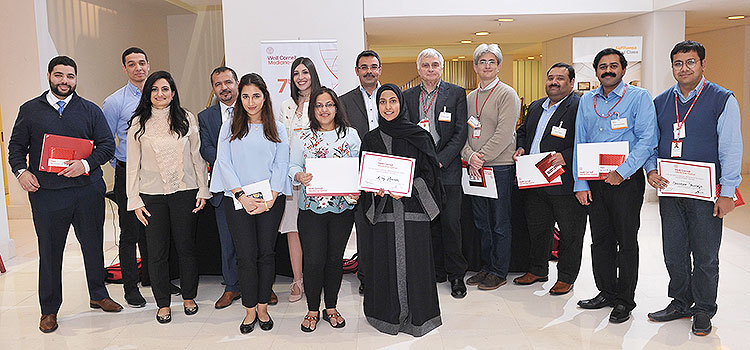Annual Research Retreat focuses on success
 Faculty and staff pose with the winners and runners-up in the poster exhibition.
Faculty and staff pose with the winners and runners-up in the poster exhibition.
WCM-Q’s seventh Annual Research Retreat looked at the transformation of biomedical research in Qatar and the accomplishments of WCM-Q’s scientists over the past year.
This annual event is a highlight of the college’s calendar and is becoming a tradition that allows researchers to showcase their work and share their findings with their peers from across Qatar and the wider world.
Delegates attended from a broad range of biomedical institutions to hear of the latest developments in biomedical research, and also to examine the work of students, research specialists and post-doctoral scientists.
Dr. Khaled Machaca, associate dean for research at WCM-Q, recounted the program’s major successes.
Dr. Machaca said that the mission of the biomedical research program, which was only launched eight years ago, was to create a center of research excellence in Qatar.

He said: “Our goal was to become a beacon of knowledge creation, contributing to Qatar’s drive towards a knowledge-based economy, while also focusing on the health needs prevalent in Qatar. To be successful, we have had to create the infrastructure and develop the research workforce, thereby adding research capacity to the wider industry.
I am very proud to say that we have had considerable success. Over a six-year period, our scientists had their work published in 587 publications, and this culminated in an annual citation rate of 3,411 citations in 2016 alone, highlighting the impact and visibility of the research conducted at WCMQ.”
Dr. Machaca, who later delivered a lecture about his work into calcium teleporting, said that the college now has 32 active laboratories, centered around eight research cores, and employs 181 researchers, the vast majority of whom are recruited locally.
In addition, Research Division has trained 130 research specialists – 28 of whom are Qatari nationals – specifically targeting those who have a strong desire to work in research and wish to make it their career. The Nationals Training Program is also allowing WCM-Q to retain some of these extremely talented individuals as permanent employees, a major goal at the program’s inception. Furthermore, trainees from the various research training programs at WCMQ are seeding other national programs including those at the Qatar Biomedical Research Institute, Hamad Medical Corporation and SIDRA, thus contributing to a sustainable, highly trained research workforce nationally.

In addition, Dr. Machaca said that each year WCM-Q has more than 90 per cent of the medical student body undertaking research of some form, generally through the Summer Research Program. This flagship initiative allows them to conduct research at laboratories throughout the world and also allows them to act as ambassadors for the college.
The issue of research in the framework of public policy was addressed by the dean of WCMQ, Dr. Javaid Sheikh, who praised Qatar for the progress it has made in creating a fertile research environment in less than a decade.
Dr. Sheikh said: “Qatar has, in a very short time, established a robust research infrastructure and is conducting significant basic research. This will support the commercialization pipeline in the long term and will contribute towards Qatar transitioning to a knowledge-based economy. Multiple research institutions in Qatar are well on their way toward establishing collaborative programs in the fields of basic, translational, clinical and population research.
Findings from these efforts will seed the commercialization efforts led by Qatar Science and Technology Park.
“There is a drive for entrepreneurship and we now need to promote stronger partnerships between academia and industry, towards developing an integrated model of innovation.”
In the research specialists’ category, Gaurav Thareja came first with a poster detailing a genetic survey of diversity in Phoenix dactylifera trees from Qatar. Second was Areej Hezam with Exploring The Role Of UHRF1 In Adipocyte Hyperplasia, and third was Nancy Kiwan for her poster, Sleeping Patterns in Patients with Chronic Mental Disorder Maintained on Antipsychotics: Comparison to Healthy Controls and Patients not Taking Medications.
In the postdocs/research associates category, Vimal Ramachandran was awarded first prize for his poster about the potential therapeutic properties of microRNA33 in reducing cholesterol. Second was Samson Samuel for the research, Anti-angiogenic Effects of Metformin in 2-Deoxyglucose Treated Microvascular Endothelial Cells: Role of Thrombospondin-1. Third was Raphael Courjaret for his poster entitled Calcium teleporting to specific intracellular targets.